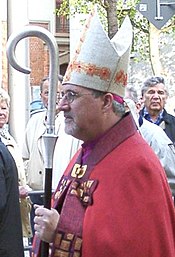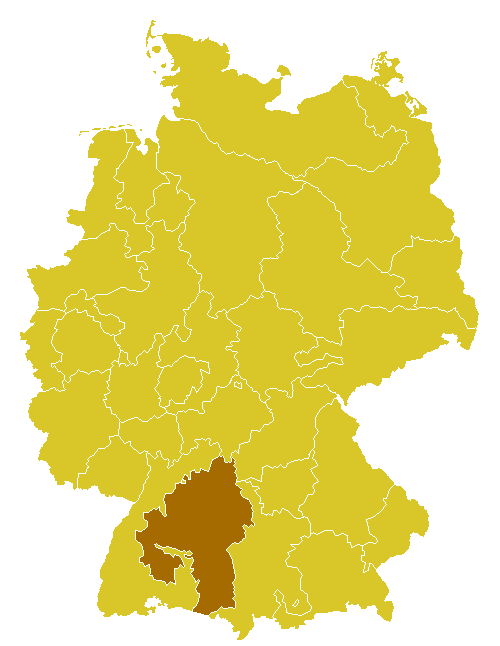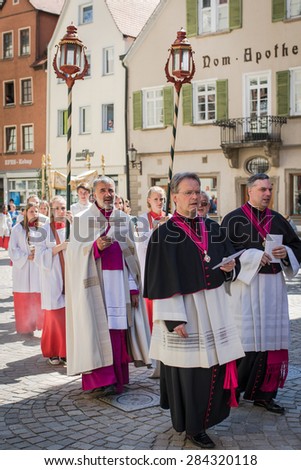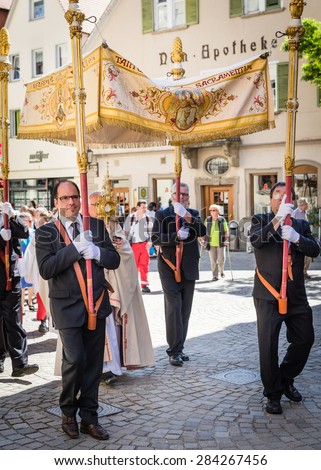Roman Catholic Diocese of Rottenburg-Stuttgart
The Diocese of Rottenburg -Stuttgart (Latin Dioecesis Rottenburgensis - Stutgardiensis ) is a diocese in the Württemberg part of the Federal State of Baden- Wuerttemberg.
- 3.1 Youth Facilities
- 3.2 Foundation Forum in the Diocese of Rottenburg -Stuttgart
- 3.3 educational institutions
- 3.4 seminary
- 3.5 Catholic administrative centers
- 3.6 Diözesanarchiv
- 3.7 monasteries
- 3.8 Media
History
The Diocese of Rottenburg was founded in 1821 by the papal Zirkumskriptionsbullen De salute animarum and Provida solersque as Catholic National Church of the Kingdom of Württemberg. This had become necessary after the inclusion of whole Catholic tracts of land in the former duchy of Württemberg. With the enthronement of the first bishop, Johann Baptist von Keller, on 20 May 1828, the establishment of the diocese was completed. The number of Catholics grew enormously after the Second World War by the expellees. Under Bishop Georg Moser was 1978 St. Eberhard raised in Stuttgart -cathedral of the diocese, and the name of the diocese was changed to the Diocese of Rottenburg -Stuttgart.
Structure of the Diocese
The Diocese of Rottenburg- Stuttgart is a suffragan of Freiburg and is divided into 25 deaneries (6 April 2008) and 1,039 municipalities ( 1 January 2006). On 1 January 2008 a restructuring process has been completed, in which the deanery boundaries where the counties were adjusted.
Bishop Gebhard Fürst, 2004 in Stuttgart-Bad Cannstatt
The Episcopal Palace in Rottenburg
Deaneries
The Dean's Office as a " middle level " between the diocese and parishes has three tasks. Firstly, it supports the parishes of the deanery in their pastoral mission, represents the Catholic Church in regional aspects of society and culture and provides the concerns of the bishop. So there is in the Diocese of Rottenburg -Stuttgart following deaneries, which are in turn divided into pastoral units and communities:
- Allgaeu Upper Swabia
- Balingen
- Biberach
- Böblingen
- Calw
- Ehingen -Ulm
- Esslingen- Nürtingen
- Freudenstadt
- Friedrichshafen
- Göppingen -Geislingen
- Heidenheim
- Heilbronn Neckarsulm
- Hohenlohe
- Ludwigsburg
- Mergentheim
- Muehlacker
- Ostalb
- Rems -Murr
- Reutlingen - Zwiesel
- Rottenburg
- Rottweil
- Saulgau
- Schwäbisch Hall
- Stuttgart
- Tuttlingen - Spaichingen
Concordat
Under Article 14 of the Reich Concordat of 1933 which is in force until today, the occupation of the episcopal see and the composition of the Chapter in accordance with the provisions of the Baden Concordat of 1932 set.
Church institutions
Youth facilities
The diocese maintains a wide variety of facilities for entertainment and promotion of youth work. Most institutions have their headquarters in Wernau, so to Example:
- The Episcopal Youth Office. This furnished by the office of bishop has the task of promoting on the basis of the statements of the Joint Synod of the German dioceses in Würzburg in 1975 and the Rottenburger Diocesan Synod 1985/86 to support youth work, and accompany.
- The BDKJ Diocesan Association. The BDKJ Diocesan Association is a federation of seven Catholic youth associations at the diocesan level. The tasks of the Association are youth politics, church politics, public relations and the protection of the financial environment for all member associations. In addition, the BDKJ maintains the youth units in the dean's office or the dean's office districts.
- The Youth Foundation just whose job it is to support projects and initiatives church dedicated young people financially.
- The Institute for the altar boys and altar girls. This is a specialized agency of the diocese, the individual acolytes Communities at the diocesan and deanery level linked, which organizes events, retreats and training courses and job aids out there.
Forum Foundation in the Diocese of Rottenburg -Stuttgart
The Foundation Forum in the Diocese of Rottenburg- Stuttgart, is a coalition of 41 church foundations, associations, religious communities and institutions in a non-profit organization which aim is to inform about the church's foundations and charitable nature and in the establishment of a foundation to support to advise ecclesiastical concerns. The Forum operates public relations to promote the founders thought in the Church and society and offers the possibility of exchange and networking of donors, foundations and religious institutions.
Educational institutions
The Diocese of Rottenburg -Stuttgart maintains four boarding schools and some schools.
- Ambrosianum Tübingen
- Albertus -Magnus -Gymnasium Stuttgart
- Episcopal Gymnasialkonvikt in Rottweil with Lateinaufbauzug
- Episcopal boarding College of St. Joseph in Ehingen (Donau)
- Musisches Martini boarding house in Rottenburg am Neckar
Seminary
In Tübingen the diocese maintains a Theologenkonvikt, the Wilhelmstift in which the candidates for the priesthood in the house during their theological studies at the Eberhard Karls University of Tübingen. The Wilhelmstift is in close proximity to St. John's Church and the Theologicum. High school graduates without the required knowledge for the study of Hebrew, Greek and Latin before completing two semesters in language Ambrosianum Tübingen. Subsequent to the study of pastoral formation takes place in the seminary in Rottenburg am Neckar.
Catholic administrative centers
The Catholic administrative centers were formed in the Diocese of Rottenburg -Stuttgart to organize the church administration more compact. The Catholic administrative centers were formed by merging the tasks of the universal Church and the care Aktuariate.
Thus does a Catholic administrative center the task of specialist advice and support for all parishes in a deanery (formerly the task of the Actuarial ), and the complete management of a total parish.
In the Diocese of Rottenburg -Stuttgart so far following Catholic administrative centers were formed:
- Catholic administrative center of Aalen
- Catholic administrative center Albstadt
- Catholic administrative center of Biberach
- Catholic administrative center of Böblingen
- Catholic administrative center of Friedrichshafen
- Catholic administrative center of Göppingen
- Catholic administrative center of Heilbronn
- Catholic administrative center Hohenlohe (headquarters in Schwäbisch Hall )
- Catholic administrative center of Reutlingen
- Catholic administrative center Riedlingen
- Catholic administrative center of Rottweil
- Catholic administrative center of Schwäbisch Gmünd
- Catholic administrative center of Stuttgart
- Catholic administrative center of Tübingen
Diocesan Archives
The Diocesan Archives is located in Rottenburg am Neckar and is responsible for the diocese was founded in 1821. It also secures the area concerned documents from before the foundation of the diocese and deanery and parish archives. In addition, the church records of about 260 parishes, as well as archives of separate ecclesiastical institutions and bodies can be stored in Rottenburg. A further object of the diocesan archive is to look after all the bishop subordinate ecclesiastical archives.
Monasteries
Before the founding of the diocese there was on their present territory of several monasteries of national cultural and political significance, including Maulbronn and in the course of secularization repealed early 19th century monasteries Obermarchtal, Ochsenhausen, Rot an der Rot, shot Ried, Weingarten, Wiblingen and Zwiefalten and the prince provost Ellwangen.
Active, used by religious communities monasteries in the diocese of Rottenburg -Stuttgart include:
- Monastery Bonlanden
- Monastery Brandenburg ( Teodone - Regglisweiler )
- Abbey of St. Erentraud, Kellenried
- Trinity Monastery Laupheim
- Monastery Reute
- Franciscan Monastery Schwäbisch Gmünd
- Monastery Sießen
- Monastery Untermarchtal
- Convent of the Sisters of Saint Clare in book Stock at Isny
- Abbey Neresheim
- Carthusian monastery at Marienau Bad Wurzach
- Franciscan monastery in Weggental in Rottenburg
- " Klösterle " of the Franciscans in Wangen im Allgäu
- Salvatorianerkloster mountain of God in Bad Wurzach
- Convent of the Redemptorists on the Schoenberg at Ellwangen
- Monastery of the Oblates in Schemmerhofen - Aufhofen in Biberach an der Riss
- Trinity Mountain, branch of the Claretians in Spaichingen
Media
The editors Catholic Church in the private radio ( GAI ) conducted on behalf of the Diocese of television and radio programs that are broadcast by the private broadcasters in the diocese, some of it by the end of third license.
Major churches
St. Eberhard in Stuttgart
Among the most important churches of the diocese include the cathedrals:
- Cathedral of St. Martin in Rottenburg
- Co-Cathedral: Cathedral of St. Eberhard in Stuttgart
Additionally, there are several other church buildings particularly significant places of faith in the diocese, such as:
- Abbey Neresheim Neresheim
- St. Vitus Basilica in Ellwangen
- Schoenberg Church ( Sanctuary " to Our Lady " ) in Ellwangen
- Minster of St. Peter and Paul in Obermarchtal
- Gmuender Münster ( the Holy Cross ) in Schwäbisch Gmünd
- Collegiate Church of St. Nicholas ( Comburg ) in Schwäbisch Hall
- St. Martin and Oswald Basilica in Weingarten
- Minster of Our Lady in Zwiesel
- German Order of St. Peter and Paul Cathedral (Heilbronn)
- St. Martin Basilica in Ulm- Wiblingen
Sanctuary Schoenberg in Ellwangen
Munster and former monastery church in Obermarchtal
Parlerbau Gmuender Münster in Schwäbisch Gmünd
Collegiate Church of St. Nicholas on the Comburg in Schwäbisch Hall
Abbey church Basilica of St. Martin and Oswald in Weingarten
Pilgrimage and former monastery church Zwiefalter Münster
German Order of St. Peter and Paul Cathedral in Heilbronn
Diocesan Patron
The patron of the Diocese of Martin of Tours. In following are the main tasks of the Diocese of Charity and Mission. The patronal feast is celebrated on 11 November, the feast of St. Martin of Tours, as a Solemnity in the whole diocese.
Medals and Decorations
In the diocese each year on Patronatstag, 11 November, the Martinus medal, " as a sign of gratitude and in recognition of outstanding achievements in the spirit of the saint of the Diocese of Rottenburg -Stuttgart, St. Martin ," as stated in the award document, by given to the bishop.
Membership Development
The diocese experienced - as the other German dioceses - for some years a decline in membership. The reasons include demographic change and leaving the church. According to Bishop Gebhard Fürst have the abuse scandal " as a valve " worked, would penetrate the now much long Trapped outward. In the diocese there were after the abuse scandal about 15,500 Catholics, who have resigned.










